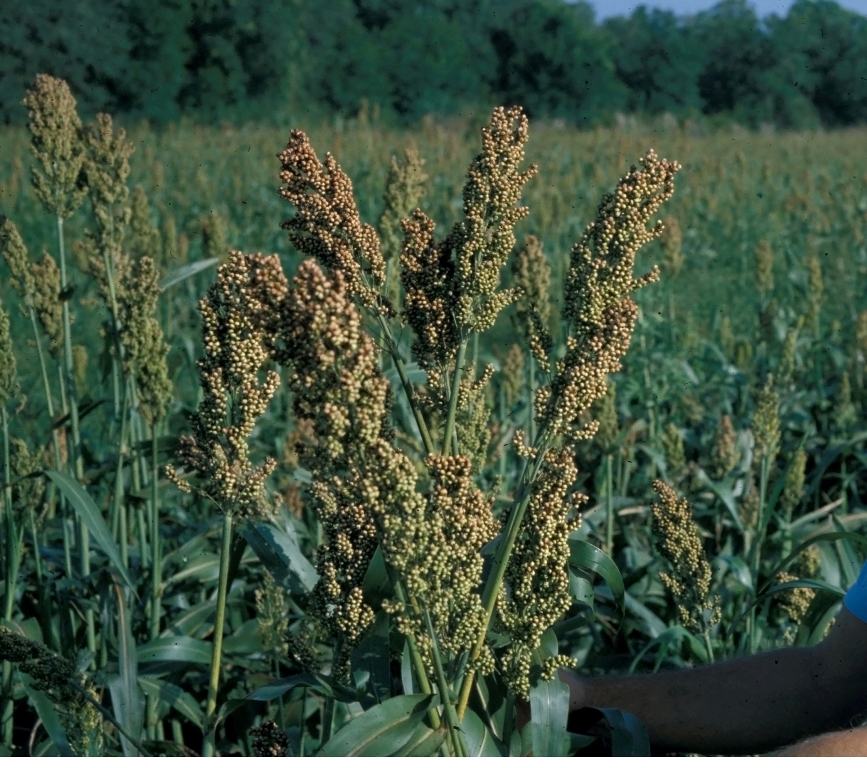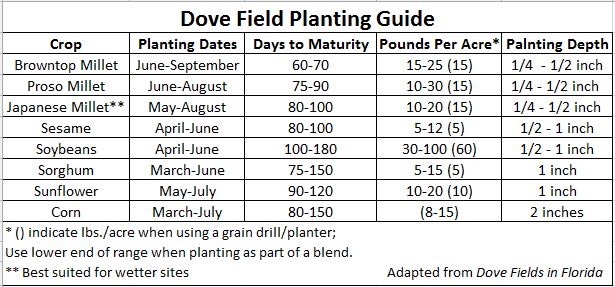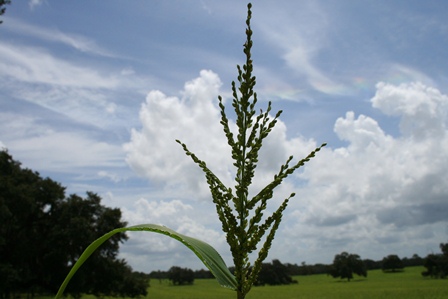
Doves are attracted to the seeds produced by many warm season crops, like the sorghum shown above.
Photo Credit: Forages of Florida
We are roughly 100 days away from the beginning of dove season. Planting crops that produce attractive food sources for doves can be an effective way to increase your chances of having successful hunts. If you are considering planting a dove field this year, now’s the time to get started.
They key to maintaining a strong population of doves in your area is nutrition throughout the year. Some form of planted supplemental feed can enhance both the reproductive efficiency of the local population, and the consistency of birds flying over your property. There are several crops that can be planted right now that are very effective tools to attract doves to your land. Millet, corn, sorghum, sesame, and soybeans are all good options for mid-summer planting.
Doves are primarily attracted to a field by crops that produce that produce seed at the end of their lifecycle. With this in mind, it is important to plan a field so that some seed is available to the dove throughout as much of the season as possible. In order to do this you must consider how long it will take a crop to produce seed, and let that determine optimal planting dates.
Before you get your calendar out and start counting days, there are some options to consider.
-
Start now
-
Plant ¼ of your total area
-
Wait two weeks plant another ¼
-
Repeat process until the whole field is planted.
Staggering planting dates will help extend the amount of time when seeds will be plentiful in the field. To further extend seed availability, plant a variety of species that mature at slightly different times. Using the planting strategy above, you could plant a mixture of browntop millet, proso millet, and sesame. This mixture ranges in maturity from 60 to 90 days, meaning the earliest planted, earliest maturing plants would have seed around the first of September. Remember, it’s good to have mature seed well before the season so the birds have a chance to find it; but you don’t want all of it ready early or it will be gone before the season starts. Longer season crops like corn, sorghum, and soybeans can also be used effectively in blends. However, their maturation times can vary greatly from variety to variety, so be sure to check with your seed supplier about the maturity dates of the specific varieties they carry, then determine planting dates accordingly.  Throughout the season it is common practice to mow sections of the field a few days before a planned hunt. Mowing the crops scatters all of the seed on the ground making it more accessible and attractive to doves. Keep in mind that you should only mow sections of the field that have mature seed, this means, in most cases, you will mow the field in the same order you planted it. Mowing is not always necessary; after seed is produced annual plants die and begin to deteriorate. As the plant deteriorates it will drop seed gradually. Allowing this process to take place will make the field viable for longer. When a section of the field is mowed it is effectively “used up” in a relatively short amount of time.
Throughout the season it is common practice to mow sections of the field a few days before a planned hunt. Mowing the crops scatters all of the seed on the ground making it more accessible and attractive to doves. Keep in mind that you should only mow sections of the field that have mature seed, this means, in most cases, you will mow the field in the same order you planted it. Mowing is not always necessary; after seed is produced annual plants die and begin to deteriorate. As the plant deteriorates it will drop seed gradually. Allowing this process to take place will make the field viable for longer. When a section of the field is mowed it is effectively “used up” in a relatively short amount of time.

Browntop Millet is a fast maturing crop frequently used in dove fields.
Photo Credit: Forages of Florida
Proper soil fertility is important to the successful establishment of any crop. Before you plant, you should have a soil analysis performed and follow the corresponding lime and fertilizer recommendations. Another key to successful establishment is proper seedbed preparation. All of the crops listed above will perform much better if they are planted into a prepared seedbed that is well tilled, moist, and firm. If a grain drill or planter is not used, special attention should be paid to ensure that adequate contact between the seed and soil is established. This is often achieved by cultipacking the broadcasted seed into the seedbed. It is important to incorporate the seed into the soil not only for the success of the plant, but to prevent unintentional baiting of the field. Spreading seed or grain on top of the ground (when not followed by some type of incorporation) is considered baiting. It is illegal to hunt doves over a baited field. Go to the Florida Fish & Wildlife Commission’s: Dove Hunter’s Hotline for the complete rules and regulations associated with dove hunting, and also specific guidelines for hunting over grains: Dove Hunting and Baiting in Florida.
Further details and economic analysis are available in Dove Fields in Florida; you can also contact your county UF/IFAS Extension Office for soil analysis supplies and further information about any of the topics discussed in this article.
